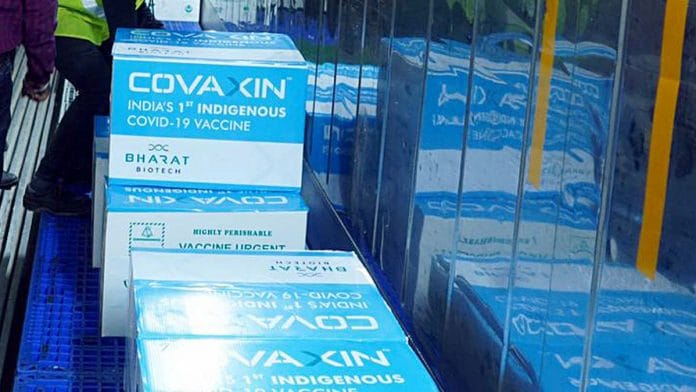New Delhi: Immune responses induced by Covid vaccine Covaxin last for at least up to three months, with the 28-day interval between two doses of vaccine showing more promise than the 14-day interval, according to a new study published Tuesday.
The study, carried out by researchers from the Indian Council of Medical Research (ICMR) and Bharat Biotech, and published in the journal Lancet Infectious Diseases, presents interim results from the phase 2 trial of the vaccine, along with analysis from the three month follow-up of participants of the phase 1 trial.
Covaxin, developed by Hyderabad-based vaccine manufacturer Bharat Biotech in collaboration with the ICMR, is India’s first indigenous Covid vaccine.
Phase 1 and 2 trials
During the phase 1 trials, participants were divided into four groups, with each administered a different formulation of the vaccine. The first group received 3 μg with an adjuvant called Algel-IMDG, the second group got 6 μg with Algel-IMDG, and the third group received 6 μg with the adjuvant Algel. The last group, known as the control group, got only Algel without the vaccine, the study said.
An adjuvant is a substance that increases or modulates the immune response to a vaccine.
The phase 1 trial was done with the intention of selecting two most suitable formulations for the vaccination programmes. Based on acceptable safety outcomes and immune responses, the 3 μg with Algel-IMDG and 6 μg with Algel-IMDG formulations were selected for progression to a phase 2 trial.
Also, in the first phase, the two doses of the vaccines were administered 14 days apart. However, in the second phase, the interval between the two doses was increased to 28 days.
The objective of the phase 2 trial was to study the differences in immune response between the 3 μg with Agel-IMDG and 6 μg with Algel-IMDG groups.
Data from 380 vaccinated adults and adolescents showed that the vaccine enhanced immune responses. Moreover, the neutralisation responses — where the virus is blocked from causing disease — was significantly higher when the interval between the two doses were increased to 28 days.
While both 3 μg with Algel-IMDG and 6 μg with Algel-IMDG vaccine groups had similar safety outcomes, the researchers decided to use 6 μg with Algel-IMDG for the phase 3 of vaccine trials because the T-cell mediated immune response was more pronounced after three months, the study noted.
The team reported that the most common adverse event in the phase 2 trial was pain at the injection site, followed by headache, fatigue, and fever. However, no severe or life threatening adverse events were reported.
Vaccines can broadly be categorised into two types — inactivated and live vaccines. Covaxin, also referred to as the BBV152, falls under the category of inactivated vaccines.
In such vaccines, the pathogen is ‘deactivated’ so that it can no longer cause infection. However, parts of the virus can still be identified by the body’s immune system and can trigger an immune reaction.
Also read: Top WHO official backs Covaxin, says evidence maybe limited but India has every right to approve
Antibody levels
The study also noted that since the trials were carried out at a time when the SARS-CoV-2 virus was widespread in the population, it is possible that antibody levels in vaccinated participants could be slightly inflated, as some of them may have unknowingly been exposed to the virus.
No cases of Covid-19 were reported in either group of the phase 2 trial. Since routine SARS-CoV-2 testing was also not done, results of the first and second phases of the trials did not allow researchers to carry out efficacy assessments.
However, in a recent statement, Bharat Biotech said its vaccine has shown an interim efficacy of 81 per cent in preventing Covid-19 in its phase 3 trial involving 25,800 participants.
The efficacy results are yet to be published in a peer-reviewed journal.
The team of researchers was also unable to assess the full scope of immune responses or the effect on the severity of the disease.
Also read: Covaxin a ‘buffet’ vaccine that can deal with mutations, others ‘a la carte’ — top virologist






